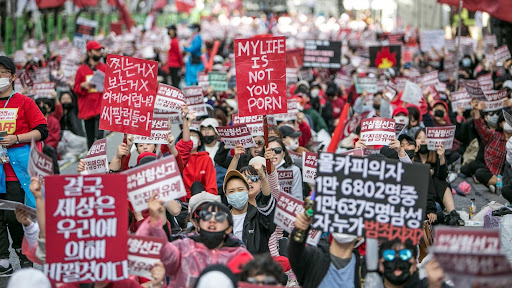What Is the 4B Movement?
The 4B Movement, originating in South Korea in 2019, stands for “Four No’s,” rejecting heterosexual marriage (bihon), childbirth (bichulsan), dating (biyeonae), and sexual relationships with men (bisekseu). Conceived in response to pervasive gender-based violence and entrenched societal expectations, the movement was a feminist declaration of autonomy. By disassociating from relationships with men, the women of 4B Movement 2024 asserted their independence from the structures they viewed as oppressive.

The movement initially gained momentum after the 2016 Gangnam murder, where a young woman was killed after rejecting a man’s advances, igniting outrage among South Korean women over systemic misogyny. Since then, the 4B Movement has become a powerful means for women to reclaim control over their lives. As one South Korean woman stated, “It’s not just about refusing relationships with men—it’s about refusing a system that devalues us.”
Why Is the 4B Movement Gaining Popularity in the U.S.?
The 2024 re-election of Donald Trump has driven many American women to explore the 4B Movement USA as a form of protest. Social media has been ablaze with posts encouraging American women to adopt similar stances, rallying around the 4B Movement principles as a form of reclaiming autonomy and challenging a political climate that many feel has rolled back women’s rights. Twitter and TikTok are filled with messages echoing this sentiment, with one user stating, “American women, it’s time to learn from the Koreans. We need to adopt the 4B Movement for real.”
The frustration among American women stems not only from Trump’s election win but from policies perceived as hostile to women’s rights, such as the overturning of Roe v. Wade, which left abortion rights up to individual states. For many, the principles of the 4B Movement USA resonate as a radical but empowering response to what they see as a political environment that does not value women’s autonomy.
Understanding the Four No’s: The Core Tenets of the 4B Movement
- Bihon (No Marriage): Many women in the 4B Movement refuse marriage, viewing it as a traditional institution that historically limits women’s choices.
- Bichulsan (No Childbirth): The decision to forego childbirth aligns with rejecting societal expectations that women must bear children, which is seen as a responsibility imposed on them by patriarchal structures.
- Biyeonae (No Dating): Refusing to date is a form of independence from social pressures that associate a woman’s value with her relationships with men.
- Bisekseu (No Sexual Relationships with Men): Avoiding sexual relationships with men is a decision to control one’s own body, free from the expectations placed upon women.
For many supporters of the 4B Movement 2024, these principles are not just symbolic; they are deliberate actions that allow women to take a stand against systemic inequalities. By adopting the tenets of 4B, women are challenging social expectations while embracing a new model of autonomy.
A Radical Response to Political Frustration
Supporters of the 4B Movement USA see the movement as a way to voice dissatisfaction with Trump’s victory. The trend underscores growing frustration over gender inequality, which many feel is exacerbated by Trump’s policies and rhetoric. Following his re-election, social media discussions regarding the 4B Movement 2024 skyrocketed, with hashtags and videos advocating for American women to consider boycotting relationships with men as a form of protest.
American women are not only inspired by the ideals of 4B Movement USA but are considering adapting its principles as a domestic response to their frustrations. Many argue that the movement challenges ingrained gender expectations, with supporters claiming that it empowers women to challenge systemic inequalities and assert independence.
Criticism and Cultural Backlash
Despite its appeal, the 4B Movement USA has faced significant backlash both in South Korea and the U.S. In South Korea, some men have criticized the movement, calling its participants “selfish” for abandoning traditional roles, while similar critiques have emerged in the U.S. Some argue that the movement is extreme, with Trump supporters on social media calling it “nonsense” and suggesting that women who refuse to date or marry are overreacting.
Will the 4B Movement USA Take Root ?
The 4B Movement’s surge in popularity within the U.S. highlights a shift in how American women are approaching gender equality and autonomy. As interest grows, some American women wonder if the 4B Movement could evolve into a uniquely American feminist response. Although the principles may seem radical to some, the movement is resonating with a segment of American women who are dissatisfied with the current political landscape.
Whether or not 4B will take root in the U.S. as a widespread movement remains to be seen. However, its growing popularity suggests a profound desire among women to redefine their place in society and to resist a system they feel does not prioritize their rights and well-being. In the words of one American supporter, “Maybe we don’t need to adopt 4B exactly, but the message is clear: we need to stand up for ourselves, now more than ever.”


